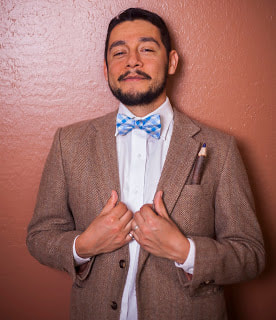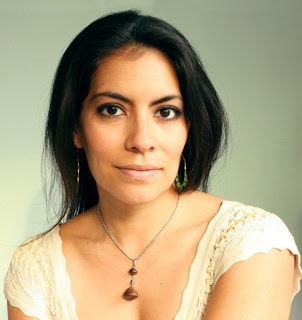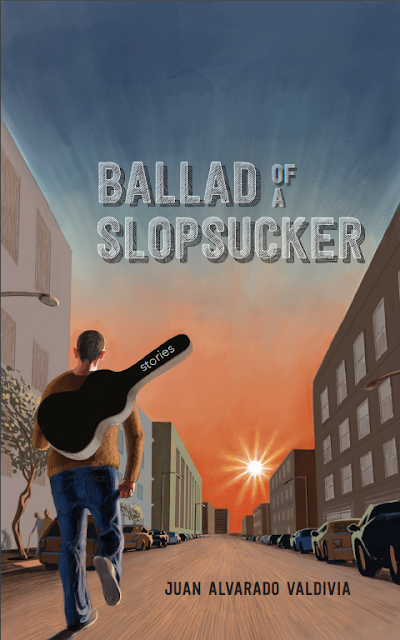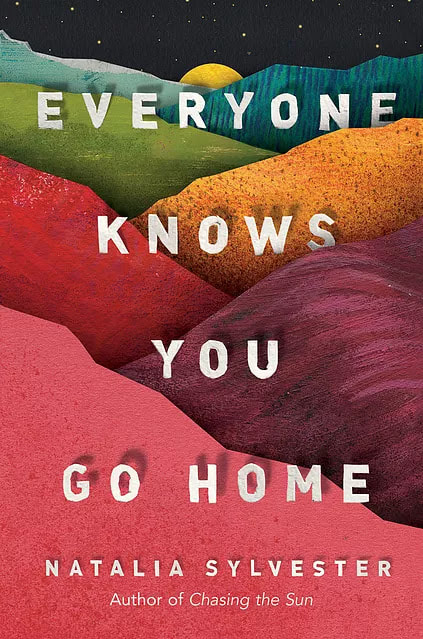“Ten years later, Elvis regretted their breakup more than anything in his life.” Ballad of a Slopsucker The parking lot at Horatio’s was packed for the ten-year reunion of San Leandro High’s Class of ’87 and Elvis Borboa—who had been voted Most Likely to Be on MTV his senior year—sat in his car near the back of the lot, sucking on a cigarette like nicotine was oxygen. An hour before, he had stood in front of his closet mirror wondering, Should I stay or should I go? He tried on shirt after shirt until he narrowed it down to two—a long-sleeve button-down shirt so it’d look like he had made something of himself, or a striped polo shirt that said I-don’t-really-give-a-shit-about-appearances-but-I’ll-look-presentable. No matter which one he wore, Elvis saw a twenty-eight-year-old straight-edge Latino reflected back to him—the cropped hair, fitted jeans, and a shirt that covered the flaming skull tattoo on his right shoulder. As he stared at himself, he couldn’t help but wonder if the teenage, fuck-authority version of himself would have hated who he had become: just another tool; another sellout working for a big bank. While he sat in his new Honda Accord, he couldn’t shake the nervous, twisted feeling in his stomach. He popped the Eagles’s Greatest Hits into the CD player. He skipped to “Best of My Love,” which was totally un-metal of him. A long drag from his cigarette followed. It had been months since he had smoked. Oddly enough, the song soothed him even though it reminded him of Susana, his ex-girlfriend from high school. Ever since they graduated, he had occasionally daydreamed of playing and dedicating that song to her (which was totally un-metal of him). After he flicked the cigarette out the window, Elvis flung the car door open. He strode across the parking lot. On his way to the entrance, he noticed a few faces that looked familiar. He couldn’t remember their names, but he knew they were smart kids back in school. Would they recognize him now? Would anyone recognize him? Standing by the entrance, next to the part of the restaurant that resembled a kitschy lighthouse, was Joey Marchment. He was smoking a cigarette by himself. Back in high school he was a quintessential stoner-skateboarder. He had gone to a couple of Elvis’s shows. Shit, they even shared a joint at one of their high school parties. Joey had also cleaned himself up for the occasion. Dress shirt, pair of khakis, shiny dress shoes instead of his old Dr. Martens. His bleach-blonde hair—which used to be long and greasy as if he flipped burgers for a living—was now short, thinning, and slicked back. Like Elvis, he had developed a respectable beer paunch. “Elvis Borboa?” Joey said. “What’s going on, Joey,” Elvis said, shaking his hand. “Glad you remember me.” “Of course, man. You were Elvis, the heavy metal god!” Elvis used to be the front man of a thrash metal band he started at San Leandro High with his best friend, Dontae. The band’s name was Slopsucker. In high school Elvis sported long, curly black hair, torn-up jeans, and a black leather jacket his dad had handed down to him. “You still play?” Joey asked. “Nah, man.” Elvis couldn’t help but hang his head. “That’s too bad. I remember you used to shred.” “Yeah, well, you know, it’s one of those things. Hardly anyone can pay the bills playing a six-string.” “Fucking A, man, fucking A,” Joey said, nodding and slowly turning his head like he was watching a thought gently bob away. Inside, Elvis heard a loud hum of chatter around the corner. Goddamn it, he thought. People were already asking about his former musical self. A sign by the front podium read, “Class of ’87 Reunion!” An overly smiley Asian woman with a name tag that read “Annie Chow” sat behind a long table covered with rows of printed name tags. They exchanged pleasantries. Elvis remembered she was a major kiss-up in school. She parked her rear front row and center in their physics class so she could laugh at all the inane jokes from their teacher along with all the other voracious grade-grubbers. On top of being pretty, she had always been smart and driven. Once he saw the big glittery rock on her ring finger, Elvis figured she got just about everything she ever wanted in life. He saw his name tag on the table. He scanned the remaining ones for Susana and Dontae’s. They were MIA. Were they coming? Were they already there? Would they talk to him, or tell him to fuck off? Would Susana be there with someone? A boyfriend? Husband? What if she was inexplicably free after all these years? The classy restaurant overlooked the San Leandro Marina. The dining area around the bar was roped off for their reunion. All the tables had been cleared out so everyone could mingle. Seventy or eighty people convened throughout the room. Most of his old classmates had dressed up as if they were dining at a posh restaurant in San Francisco, the city he had called home since graduating from high school. Booming laughter from the patio startled him. There was so much happening around him. Before he realized what he was doing, Elvis beelined to the bar. He could’ve walked past Gandhi, Cindy Crawford, or Ozzy Osbourne and not noticed them. Man, did he need a drink. As he leaned against the counter, staring at the bartender, trying to will him to look his way, Elvis scanned the bar as though his birth name was Cool Breeze. He locked eyes with a classmate whose name tag read “Mindy Roberts.” Her jaw dropped. She waved with such glee that he waved back, although he had never—as far as he remembered—had a conversation with her. Two stools down from Mindy was George, a wild-haired Samoan who had streaked across the football field during a homecoming game Susana had dragged him to. And then there she was: Susana. The woman of his sad and sorrowed dreams of unrequited love. She stood in a circle of women gathered at the other end of the bar. His heart bottomed. She was fucking gorgeous and cute as ever—the same big brown eyes, light-brown skin, and magnetic smile that drew people to her. Her black hair fell over the straps of her blue summer dress. Elvis thought she had never looked so beautiful—except maybe at the junior prom they had gone to together. Once he spotted her, Elvis was done for; he couldn’t keep himself from stealing glances at her. After all those years they were actually in the same room. And to his complete and dizzying surprise she seemed to be alone. No possible significant other satellited around her. While he watched her, Elvis couldn’t help but remember—as much as he didn’t want to—the last time they were together. It all went down on a Saturday afternoon, less than two months before their senior prom. Elvis was in his bedroom restringing his black Jackson King V guitar. Venom’s classic Black Metal blared from his stereo. It was 1987, a year after thrash metal’s zenith when Metallica’s Master of Puppets, Slayer’s Reign of Blood, Megadeth’s Peace Sells . . . but Who’s Buying?, and Kreator’s Pleasure to Kill came out. Elvis’s dad was in the backyard, working in his shed, when his mom knocked on the door. “Yeah,” Elvis shouted over the music. “Susy’s here for you!” she yelled from behind the door where Elvis had taped a poster of Machu Picchu shrouded in mist. “Shit,” he said to himself. He took a deep breath as he lurched to the front door. Susy stood on the other side of the screen door. She wore a black tank top, faded blue jeans, and the green Chuck Taylors he had doodled on with a permanent marker. (He had scribbled “Elvis lives!” on the back heel.) She was concealing something behind her back. “Hey, you wanna come in?” Elvis said, creaking the screen door open. “That’s okay,” Susy said. “My dad’s taking us out to lunch with one of his friends. I was running some errands and just wanted to pop in to give you a surprise.” “Oh yeah, what you got?” Though he was trying to play it cool, Elvis could feel his stomach knot. The night before, he had snuck out to hit up a party without Susana. Celeste White, the lead cheerleader at San Leandro High, had invited him. Celeste White, the hottest girl in school, had flirted with him. She professed to Elvis that she liked him. This was certifiable wet dream material. To boot, she kept putting her hand on his arm and brushing her blonde hair while they talked. After he stumbled back home in a fog of blissful drunken stupor, he woke up thinking about how good it would have felt to make out with her. To have his hands all over her. The only reason he kept his paws to himself was because he and Susy had been together for two years. Susy handed him a mixed tape. On the cassette case spine she wrote “Heavy Shit” and drew a smiley face. Years later, remembering those details slayed him. “I really liked your last mix,” she said. “I think you’re right—the Scorpions are the best thing to ever come out of Germany.” Elvis combed his long hair to the side so it wouldn’t cover half of his face. He stared off at the front lawn. Earlier that morning he had convinced himself to break up with her. He just didn’t know when to pull the plug. “You okay?” she asked. Elvis had not hugged and kissed her like he typically would when she’d come over. “Yeah, I’m just tired. Wait—let me walk you to your car.” Susy marched to her old gray car parked in front of his parents’ house. He followed. She walked with her head lowered, staring at the walkway like she knew something was up. Afterward, Elvis wondered if she could sense what was coming. “Your mind seems to be somewhere else,” Susy said as they approached her car. Elvis took a breath. “Susy, this is something I’ve been thinking about for some time. I’m just, uh—I, umm—I think we should date other people.” Elvis never forgot the face Susy made—her mouth dropping, her eyes opening wide. “Are you serious?” she said, staring up at him. She took a step forward. “You’ve been thinking about this for some time? Since when?” “I don’t know. It’s been a while.” “So why are you saying this to me now? You wanna go out with someone else? Is that it?” Elvis took a step back. He thought she might try to slap him. “Who is it, Elvis? Who is it?” “It’s no one, Susy! I’m just afraid of this getting too serious. I’m sorry. I don’t know how else to say it.” “So what are you really saying? Are you breaking up with me? Is that what you’re trying to tell me?” “No, Susy. I just—think it’d be a good idea if we saw other people.” Susy crossed her arms. She glared at him until he looked away. “That’s bullshit. And I am not okay with us seeing other people. If all you want to do is break up with me, then grow some damn balls and do it.” Susy brushed past Elvis and stormed to the driver’s-side door. Once she fumbled for her keys, she stomped back to him. “Give it to me,” she said. She snatched the tape from Elvis, threw it on the sidewalk, and smashed the case with her foot. She flung the door open and slammed it before she drove off with the motor roaring. Broken cassette in hand with its tape dangling, Elvis walked back into his house. He bunched up the loose tape in his hand. He didn’t want his mom to see it and ask what had happened. In his room, the door closed, Elvis flipped through his milk crate full of albums. He took out Metallica’s Ride the Lightning. The album cover had an electric chair floating in a dark sky with bolts of lightning. He cued the record to “Fade to Black.” He blasted it, all dramatic, then he lay on his bed, hands cupped behind his head, clutching the cassette as the opening guitar notes filled the room. He stared at the picture of his idol, Tom Araya—the Chilean bassist and lead singer for Slayer—taped on the ceiling above his bed. He felt shitty about what he’d done. They had been friends since junior high when he and Susy took Spanish classes together (the equivalent of Rob Halford taking beginner’s classes for heavy metal screeching). During sophomore year he walked her home practically every day unless she was working on the school paper, having soccer practice, or attending one of her Chicano-power MECHA meetings. Susy had lost her virginity to him. That was a big deal to him as well. And she was the first girl—and maybe the only one—he had ever loved. By then Elvis was getting caught up in all his self-hype about their band, especially after Slopsucker blew away the other musical acts at their school talent show. He truly believed that part of his life was merely the beginning of something bigger. His bandmates, Dontae and White Trash Phil, talked about becoming the best thing to come out of shit town San Leandro, like how Metallica’s Cliff Burton had come out of neighboring Castro Valley to become the most badass metal bassist on the planet. Elvis didn’t want to be like everyone else. He didn’t want to turn out like his mom and dad, who never seemed happy—more like they were stuck with one another. He wanted a rock ’n’ roll kind of life: the thrill he’d get when he would thrash his head and flail on a guitar. The way he felt ten feet tall onstage in front of a crowd. The communion he felt playing with his bandmates. “It’s one life you live,” his father—a former bohemian—liked to tell him. Una vida. Susy was a way cool chick, but Celeste White—the girl every straight guy in the locker room openly fantasized about—was the Big Leagues. Susy didn’t fit in with the flashy, VH1 behind-the-scenes documentary Elvis thought his life could become. He was afraid that he and Susy would turn out like his mom and pop someday. He was afraid of growing up to become like his dad, living his dreams vicariously through one of his children since he was too chickenshit to have truly chased them when he was younger. After “Fade to Black” ended, the turntable needle hissed on a constant loop. Elvis leapt off his bed. Fuck it, he thought, chucking the tape into his trash can. In that moment he practically thought of their breakup as some life lesson; he rightly figured life would have its share of difficult decisions he would have to make. Like dumping a sweet girl for the hottest chick in school. Ten years later, Elvis regretted their breakup more than anything in his life. .... From Ballad of a Slopsucker: Stories by Juan Alvarado Valdivia. Copyright © 2019 University of New Mexico Press. Look for it in 2019 at UNM Press site here.  Juan Alvarado Valdivia is a Peruvian American writer born in Guadalajara, Mexico, and raised in Fremont, CA. His fiction has been published in The Acentos Review, Black Heart Magazine, The Cortland Review, Label Me Latina/o, Origins Journal, and is forthcoming from Prairie Schooner. His first book, ¡Cancerlandia!: A Memoir, received an Honorable Mention for the 2016 International Latino Book Award for Best Biography in English.
0 Comments
An Uninvited Guest From Beyond the Grave November 1, 2012 The Big Day They were married on the Day of the Dead, el Día de los Muertos, which no one gave much thought to in all the months of planning, until the bride’s deceased father-in-law showed up in the car following the ceremony. He manifested behind the wheel, then stretched his arm over the back of the passenger’s seat as he turned to face Martin and Isabel. “Beautiful ceremony, mijo,” he said. The couple’s smiles froze. It seemed to take an eternity for either of them to speak, and when they did, they had little more than mumbles. Her whole life, Isabel had heard stories about spirits who spent this one day of the year with family. As a child she had built altars for her great-grandparents, vibrant tributes made out of open shoe boxes adorned with paper flowers and pictures of religious figures that looked a lot like the dioramas she created in grade school. In her teens, her family congregated around her great-aunt’s grave to clean it; one year, her mother even brought a battery-operated vacuum for the stone. “Today we remember our dead,” her mother always said.“We honor them.” Martin’s father looked more frazzled than dead, as if he was running late because he had been caught in traffic. Isabel looked to her new husband for guidance and was shocked to realize he seemed annoyed. Not afraid, because honestly her father-in-law looked harmless, just like in the few pictures she had seen of him. No, Martin looked like he had simply bitten into a pepper that was hotter than anticipated. “Did you know this would happen?” she said. “No, but it’s typical of him. Typical. Only someone so shameless would show up to a wedding uninvited.” “Martin, please!” She hadn’t expected him to be so rude. She hadn’t expected any of this at all, but her instincts to remain polite and respect her elders were deeply engrained—even more than her assumptions about life and death, apparently—and so her efforts to understand the situation were quickly overridden by her desire to make everybody feel comfortable. It was the first time she had met her father-in-law. She smoothed her white dress, which was bulging into every inch of the seat, and straightened her veil over her shoulders. “Aren’t you going to introduce us?” The old man sat quietly, waiting. “I’m not talking to him,” Martin said. “Martin, you can’t be serious.” At this, her father-in-law smiled and leaned toward her, through the small space that separated the front and back of the white Rolls-Royce they had rented. “He is, I promise you. That kind of stubbornness runs deep in our blood. Isabel, I’m Omar. Though I hope they at least told you my name?” “Of course. Encantada,” she said. In ordinary circumstances, she would have leaned in to kiss him, hug him even, but these were not ordinary circumstances. She didn’t know what laws governed the dead. Could they touch? Feel? Hold? Omar seemed as if he might shift the car out of park any moment now. Instead he placed his hand over hers, and she felt not a solid touch but a vibrant warmth, like gentle electricity. Her eyes lit up, but Martin scoffed and turned away. “Omar,” she said, letting his name empty her lungs. “Will you be joining us for the reception?” What a foolish thing to say. “You’re very kind to ask, Isabel. Thank you.” He stepped out of the still-open door of the car and began walking toward the church gardens. Neither Isabel nor Martin attempted to follow. She didn’t know how, but she knew she wouldn’t see him as she and Martin shared their first dance or cut their wedding cake. The whole evening, she didn’t have to glance over her shoulder to see if her father-in-law had arrived. And because the last thing she wanted to do was upset her new husband, she acted like it’d never happened. She couldn’t fall asleep on their wedding night. The newlyweds made love distractedly, as if the act were nothing new, and of course for them it wasn’t. They were not, by the Church’s standards, good Catholics. Before today neither had been to mass in years, and they had slept together on their third-and-a-half date and had used condoms and contraceptives and spermicide, sometimes all at once. If not new, though, she had imagined their wedding sex would feel different. Husband and wife, joining their bodies, and for the first time it wouldn’t matter if someone heard them or walked in on them or if the condom broke in eight places. They were married now. They were together for life. Martin struggled with the perfectly round buttons that climbed, one impossibly close to the next, all the way up her spine. Isabel hadn’t realized until her dress was undone how the corset had constricted her all evening. She had to take a moment to catch her breath, and the indentations that the boning left on her skin, now exposed, itched. She had wanted to make love to him in new ways, she really had, but more than that Isabel wanted to lie next to him, close her eyes, and open them to find Martin still there the next day, and the next, and the next after that. When it was over, and they untangled their bodies, the newlyweds stared at the ceiling. She sighed. “That was wonderful,”she had meant to say, but the words that came out instead were, “What’s wrong?” Martin brought his hand to his forehead. “I didn’t know he was dead.”  Born in Lima, Peru, Natalia Sylvester came to the US at age four and grew up in Florida and the Rio Grande Valley in Texas. She earned her BA in creative writing from the University of Miami, is a faculty member of the low-residency MFA program at Regis University, and works as a freelance writer in Austin. Her work has appeared in Bustle, Catapult, Electric Literature, Latina magazine, and the Austin American-Statesman. Natalia’s first novel, Chasing the Sun, was named the Best Debut Book of 2014 by Latinidad. Her latest novel,Everyone Knows You Go Home, has been named a Best Book of 2018 by Real Simple magazine and is a finalist for the International Latino Book Awards. |
Archives
July 2024
Categories
All
|
Donate and Make Literature Happen
is published by the Somos En Escrito Literary Foundation,
a 501 (c) (3) non-profit, tax-exempt corporation. EIN 81-3162209




 RSS Feed
RSS Feed